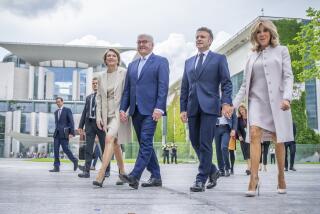Pope at Home on 1st Foreign Trip
- Share via
COLOGNE, Germany — On a mission to reclaim the wavering souls of Christianity’s young generation, Pope Benedict XVI made his first foreign pilgrimage Thursday in a test both of his ability to woo a crowd and to build bridges to other faiths.
Returning to his German homeland for the first time since his election as pope four months ago, Benedict arrived in this graceful Rhineland city to lead World Youth Day. Hundreds of thousands of young Roman Catholics are coming from all over the world for the weeklong carnival.
“Say your own ‘yes’ to God,” Benedict told crowds that lined the Rhine River to greet him. “Dear young people, the happiness you are seeking, the happiness you have a right to enjoy, has a name and a face: It is Jesus of Nazareth.”
The pope preached from the bow of a flower-bedecked ferry that cruised down the Rhine, in what one commentator called a Wagnerian flourish, then docked at Cologne’s double-spired Gothic cathedral. His white cassock whipped by the wind, he called on the faithful and unbaptized alike to find room in their hearts for God.
Thousands of pilgrims clustered along the riverbanks, and many waded thigh-deep into the water, to catch a glimpse of Benedict. Five boats carrying pilgrims plied the waters alongside the pope’s vessel, all waving brightly colored flags from more than a hundred nations.
For this highly intellectual and conservative pope, few theological issues are more important than the revival of Christian identity, which he sees as being threatened by increased secularism and permissiveness.
Germany in many ways embodies the problem: Church attendance is down, half of the country’s Christians aren’t Catholic, and those who are frequently diverge from Vatican teachings.
Winning over youth, especially in Europe, is key to “the church’s vitality,” Benedict said.
“Here we find a rich cultural and spiritual heritage, which even today, in the heart of Europe, testifies to the fruitfulness of the Christian faith and tradition,” he said.
Benedict also is using the visit, the highest-profile activity of his papacy so far, to cast an agenda that includes reaching out to other religions. As Cardinal Joseph Ratzinger before his elevation, he was frequently dismissive of other faiths.
The pope will meet today with Jewish leaders at a synagogue that was rebuilt after its destruction in 1938 by the Nazis. He will become only the second pope to enter a synagogue, and the fact that he is a German who once belonged to the Hitler Youth movement gives the gesture added resonance.
On Saturday, Benedict will meet with Muslim leaders, a particularly significant overture in today’s climate of fear involving radical Islam.
The pope said both sessions were close to his heart and represented “important steps along the journey of dialogue and cooperation” toward a “more just and fraternal future.” He evoked the history of Cologne, founded by the Romans and one of Germany’s most ancient cities, as the template for tolerance and comprehension among cultures.
But in three speeches on his first day in Cologne, Benedict cited the case of Edith Stein, a Jew who converted to Catholicism and spent time in a Carmelite convent in this city before she was killed in a Nazi concentration camp. The church’s decision to make her a saint riled Jewish groups. They have noted that she died because she was a Jew, not because she was a nun, and canonization fails to recognize that.
Young Roman Catholics have known only one pope: John Paul II reigned for 27 years until his death in April. Benedict, who is seen as more socially awkward, is inevitably measured against his charismatic predecessor. John Paul founded World Youth Day and made international travel a cornerstone of his papacy.
Tina Schmidt, a 33-year-old nursery school teacher from Munich, said she was disappointed in a pope she found too cold and distant.
“I saw John Paul II twice in Rome, and although he was a hard-liner too, I felt thrilled. I got goose bumps,” she said. “Ratzinger doesn’t have this aura.”
But Stefan Thaler, 25, of Innsbruck, Austria, who came to Cologne last weekend for the World Youth activities, said he was delighted to see Benedict and his promotion of a universal church.
“Here it is possible to experience the world church. I find that fascinating,” he said. “This is a time for new starts.”
Benedict frequently evoked the name of his “beloved” predecessor and his “extraordinary spiritual legacy.” But he dispensed of some of John Paul’s trappings. He did not kiss the ground when he landed in Cologne, and the airport welcoming ceremony was subdued.
As he walked off the plane, something John Paul could not do in his final years, a gust blew Benedict’s zucchetto, or white skullcap, off his head and back into the plane’s cabin. He went on, participating in the red-carpet ceremony bareheaded.
Later, wind also toppled the 11-foot cedar cross that sat on the bow of Benedict’s Rhine boat. It is the same cross that has been used for nearly two decades in World Youth festivals and important pilgrimages. The wind broke one arm of the cross, which paramedics on the boat reattached with a metal splint.
Speaking to journalists on the Alitalia jet that took him to Germany, Benedict said he was “very moved” to be returning to his homeland for such an evangelical opportunity.
On hand, along with German Chancellor Gerhard Schroeder, to greet the pope at the airport, President Horst Kohler said he was moved, “especially as a Protestant Christian,” to arrive at a point in history when a fellow German could be elected pope.
Times staff writer Christian Retzlaff contributed to this report.
More to Read
Sign up for Essential California
The most important California stories and recommendations in your inbox every morning.
You may occasionally receive promotional content from the Los Angeles Times.














